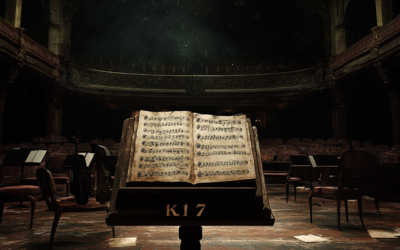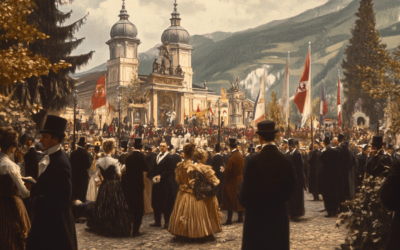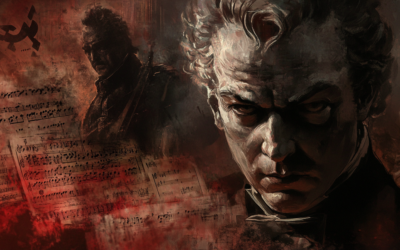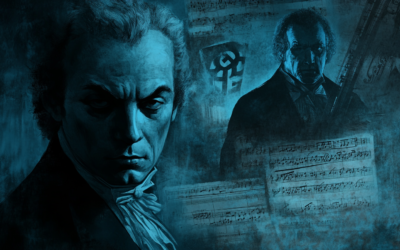Wolfgang Amadé Mozart
A Legacy Rewritten by the Shadows of History
Mozart’s image, often regarded as a universal symbol of musical genius, was heavily manipulated by the Nazi regime, a fact largely ignored in post-war efforts to “denazify” German culture. From propaganda-driven films to anti-Semitic narratives, Mozart’s legacy is far more complex and troubling than we are often led to believe.
Mozart: The Fall of the Gods
This book offers a fresh and critical look at the life of Wolfgang Amadeus Mozart, challenging the myths that have surrounded him for centuries. We strip away the romanticised image of the “natural genius” and delve into the contradictions within Mozart’s extensive biographies. Backed by nearly 2,000 meticulously sourced citations, this work invites readers to explore a deeper, more complex understanding of Mozart. Perfect for those who wish to question the traditional narrative, this biography is a must-read for serious music lovers and historians.
“Mozart, as well as Wagner, was awarded the title of honorary Nazi during the Third Reich.”
Mozart: The Fall of the Gods
In popular culture, Wolfgang Amadeus Mozart is often celebrated as a near-mythical figure, a genius whose music transcends time and borders. Yet, if we turn our gaze towards a different side of history, we find a more complex and less flattering legacy entwined with political manipulation and propaganda. Rather than the eternal “beloved of the gods,” Mozart’s image was exploited by regimes with questionable motives, most notably during the Nazi era.
After World War II, attempts were made by the Allied forces to cleanse German culture of its Nazi influences, a process known as “denazification.” Yet, despite the focus on prominent figures like Richard Wagner, Mozart’s association with the Nazi regime was largely overlooked. Throughout the Third Reich, Mozart’s music was manipulated to fit Nazi ideology, portraying him as a symbol of Aryan cultural superiority. Publications from the period were reissued, propaganda-ridden prefaces were left largely untouched, and revisions were minimal.
Heinrich Damisch, a fervent Nazi supporter and former director of the Wiener Mozart-Gemeinde, was central to this manipulation. Damisch not only contributed to anti-Semitic rhetoric but also continued to be celebrated in post-war Austria with high honours, despite his troubling legacy. His vile anti-Semitic views were ignored, and he was even honoured with the prestigious Gold Medal for services to the Austrian Republic in the late 1950s. This troubling complicity cast a long shadow on the legacy of Mozart and his association with the Salzburg Festival, a cultural institution deeply intertwined with Nazism.
Perhaps one of the most egregious examples of this tainted legacy is the film Wen die Götter lieben (Whom the Gods Love), commissioned by Joseph Goebbels in 1942. The film presented a heavily sanitised and distorted version of Mozart’s life, where figures such as Lorenzo Da Ponte, the Jewish librettist of The Marriage of Figaro, were erased, replaced by the Aryan Franz Süssmayr. This rewriting of history to fit Nazi ideology illustrates the extent to which Mozart’s image was co-opted to serve the regime’s goals.
Yet, after the war, this darker chapter of Mozart’s legacy was largely forgotten, overshadowed by the romanticised narrative of his “universal genius.” The uncomfortable truth about how his music and image were exploited was swept under the rug. Mozart remains, for many, a beacon of musical purity, while the shadows of history tell a far more disturbing tale.
In popular culture, Wolfgang Amadeus Mozart is often celebrated as a near-mythical figure, a genius whose music transcends time and borders. Yet, if we turn our gaze towards a different side of history, we find a more complex and less flattering legacy entwined with political manipulation and propaganda. Rather than the eternal “beloved of the gods,” Mozart’s image was exploited by regimes with questionable motives, most notably during the Nazi era.
After World War II, attempts were made by the Allied forces to cleanse German culture of its Nazi influences, a process known as “denazification.” Yet, despite the focus on prominent figures like Richard Wagner, Mozart’s association with the Nazi regime was largely overlooked. Throughout the Third Reich, Mozart’s music was manipulated to fit Nazi ideology, portraying him as a symbol of Aryan cultural superiority. Publications from the period were reissued, propaganda-ridden prefaces were left largely untouched, and revisions were minimal.
Heinrich Damisch, a fervent Nazi supporter and former director of the Wiener Mozart-Gemeinde, was central to this manipulation. Damisch not only contributed to anti-Semitic rhetoric but also continued to be celebrated in post-war Austria with high honours, despite his troubling legacy. His vile anti-Semitic views were ignored, and he was even honoured with the prestigious Gold Medal for services to the Austrian Republic in the late 1950s. This troubling complicity cast a long shadow on the legacy of Mozart and his association with the Salzburg Festival, a cultural institution deeply intertwined with Nazism.
Perhaps one of the most egregious examples of this tainted legacy is the film Wen die Götter lieben (Whom the Gods Love), commissioned by Joseph Goebbels in 1942. The film presented a heavily sanitised and distorted version of Mozart’s life, where figures such as Lorenzo Da Ponte, the Jewish librettist of The Marriage of Figaro, were erased, replaced by the Aryan Franz Süssmayr. This rewriting of history to fit Nazi ideology illustrates the extent to which Mozart’s image was co-opted to serve the regime’s goals.
Yet, after the war, this darker chapter of Mozart’s legacy was largely forgotten, overshadowed by the romanticised narrative of his “universal genius.” The uncomfortable truth about how his music and image were exploited was swept under the rug. Mozart remains, for many, a beacon of musical purity, while the shadows of history tell a far more disturbing tale.
You May Also Like
Constanze Mozart’s Enduring Love
Although some have doubted her devotion, Constanze’s own words and actions illustrate a widow deeply committed to preserving Mozart’s legacy. Diaries, personal correspondence, and eyewitness testimony all challenge the notion that she neglected his memory—while the circumstances around his burial grow ever more perplexing.
A Revealing New Interview on His Thematic Catalogue
We’re excited to present a brand-new interview that challenges many of the long-held assumptions about Mozart’s Thematic Catalogue (1784–1791). Conducted by Swedish journalist Henry Grynnsten, this conversation delves into groundbreaking forensic techniques—like advanced ink analysis and digital image processing—that may change the way we view Mozart’s late works.
The Rattling Symphony: A Critical Take on K. 17
Often attributed to Mozart, the K. 17 symphony is anything but refined. Lacking orchestration and filled with gaps, it raises more questions than answers about its true authorship.
The Hidden Origins of the Salzburg Festival: A Nationalist Dream
The Salzburg Festival, far from being a mere celebration of Mozart’s genius, was born out of nationalist ambitions during a turbulent period in Austro-German history. Conceived by figures like Max Reinhardt, Heinrich Damisch, and Friedrich Gehmacher, the festival was deeply rooted in ultranationalistic ideals, transforming Mozart’s legacy into a tool for cultural dominance. The truth behind its founding has long been obscured, but the primary sources tell a different, darker story.
Mozart, Wagner, and the Nazi Myth
The Führer’s admiration for Wagner’s racially charged ideology not only influenced the policies of the Nazi regime but also reshaped the legacy of Mozart. Under National Socialism, Mozart was not celebrated as a universal genius but as a symbol of German purity and superiority. His music, stripped of its international influence, was rebranded as an expression of Aryan identity, intended to unify and inspire the German people.
Mozart, the Anschluss, and Nazi Propaganda
Following the 1938 Anschluss, the Nazi regime rebranded Mozart as the quintessential German composer, using his image to promote unity between Austria and Germany. The Salzburg Festival became a platform for Nazi propaganda, distorting Mozart’s legacy to fit their nationalistic and racial agenda.







